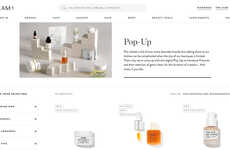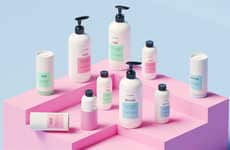
Ceramiracle's Clever Pop-Up Shares Cruelty-Free Products in China
Laura McQuarrie — June 7, 2018 — Business
References: cosmeticsbusiness
China is becoming one of the world's largest markets for skincare and cosmetics, but cruelty-free cosmetics in China are hard to come by as the country requires animal testing on many beauty goods. Additionally, animal testing is required by law for all foreign cosmetics companies—however, this is not stopping US skincare brand Ceramiracle from finding inventive ways around these regulations.
Ceramiracle proudly makes a range of products that are never tested on animals, so it created a completely stockless pop-up in China. In the space, visitors may scan QR codes to access Ceramiracle’s WeChat store and order items that are warehoused in China’s free-trade zone or shipped from a Singapore-based fulfillment center.
A growing number of companies within and outside of China are now taking a stance on cruelty-free cosmetics in an effort to make major change.
Ceramiracle proudly makes a range of products that are never tested on animals, so it created a completely stockless pop-up in China. In the space, visitors may scan QR codes to access Ceramiracle’s WeChat store and order items that are warehoused in China’s free-trade zone or shipped from a Singapore-based fulfillment center.
A growing number of companies within and outside of China are now taking a stance on cruelty-free cosmetics in an effort to make major change.
Trend Themes
1. Cruelty-free Cosmetics - More companies are finding ways to offer cruelty-free cosmetics to global markets despite regulatory hurdles.
2. QR Code Shopping - QR codes are becoming increasingly used in pop-up shops and stores as a convenient way to shop and fulfill orders.
3. Free-trade Zones - More companies may explore the option of setting up shop in free-trade zones to expand their reach in regions where regulatory hurdles can be challenging.
Industry Implications
1. Cosmetics - Companies in the cosmetics industry can explore innovative ways to offer cruelty-free products and reach new markets that have regulatory challenges.
2. Retail - Retail industry players can explore using QR codes to offer customers alternative shopping experiences such as scan-to-buy pop-up shops and stores.
3. Logistics - Logistics companies may leverage the growing demand for free-trade zones in certain regions to better serve companies and industries that face regulatory challenges.
4.5
Score
Popularity
Activity
Freshness























